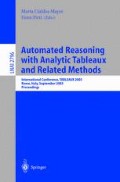Abstract
Decision procedures for the propositional cases of two different logical representations for an L-Predicate Logic generalizing Autoepistemic Logic to handle quantified variables over modal scopes are described. The first representation is Second Order Logic. The second is Z Modal Logic which extends its S5 modal laws with laws stating what is logically possible. It is suggested that certain problems are more easily solved using one representation whereas other problems are more easily solved using the other.
Access this chapter
Tax calculation will be finalised at checkout
Purchases are for personal use only
Preview
Unable to display preview. Download preview PDF.
References
Brown, F.M.: A Commonsense Theory of Nonmonotonic Reasoning. In: Siekmann, J.H. (ed.) CADE 1986. LNCS, vol. 230. Springer, Heidelberg (1986)
Brown, F.M.: ”The Modal Logic Z”, The Frame Problem in AI. In: Proc. of the 1987 AAAI Workshop, Morgan Kaufmann, Los Altos (1987)
Brown, F.M.:The Modal Quantificational Logic Z Applied to the Frame Problem. In: Advanced paper First International Workshop on Human & Machine Cognition, Pensacola, Florida (May 1989); Abbreviated version published in: Ford, K., Hayes, P. (eds.) International Journal of Expert Systems Research and Applications, Special Issue: The Frame Problem. Part A. 3(3), 169–206 (1990); Reprinted in: Ford, K.M., Hayes, P.J. (eds.) Reasoning Agents in a Dynamic World: The Frame problem, JAI Press (1991)
Brown, F.M.: Solving Modal Equivalences. In: IEEE International Symposium on Intelligent Control, October 5-8. Omni press (2003)
Eiter, T., Klotz, V., Tompits, H., Woltran, S.: Modal nonmonotonic logics revisited: Efficient encodings for the basic reasoning tasks. In: Egly, U., Fermüller, C. (eds.) TABLEAUX 2002. LNCS (LNAI), vol. 2381, p. 100. Springer, Heidelberg (2002)
Konolige, K.: On the Relation between Autoepistemic Logic and Circumscription Preliminary Report, In: IJCAI (1989)
Moore, R.C.: Semantical Considerations on Nonmonotonic Logic. Artificial Intelligence 25 (1985)
Author information
Authors and Affiliations
Editor information
Editors and Affiliations
Rights and permissions
Copyright information
© 2003 Springer-Verlag Berlin Heidelberg
About this paper
Cite this paper
Brown, F.M. (2003). Decision Procedures for the Propositional Cases of Second Order Logic and Z Modal Logic Representations of a First Order L-Predicate Nonmonotonic Logic. In: Cialdea Mayer, M., Pirri, F. (eds) Automated Reasoning with Analytic Tableaux and Related Methods . TABLEAUX 2003. Lecture Notes in Computer Science(), vol 2796. Springer, Berlin, Heidelberg. https://doi.org/10.1007/978-3-540-45206-5_19
Download citation
DOI: https://doi.org/10.1007/978-3-540-45206-5_19
Publisher Name: Springer, Berlin, Heidelberg
Print ISBN: 978-3-540-40787-4
Online ISBN: 978-3-540-45206-5
eBook Packages: Springer Book Archive

